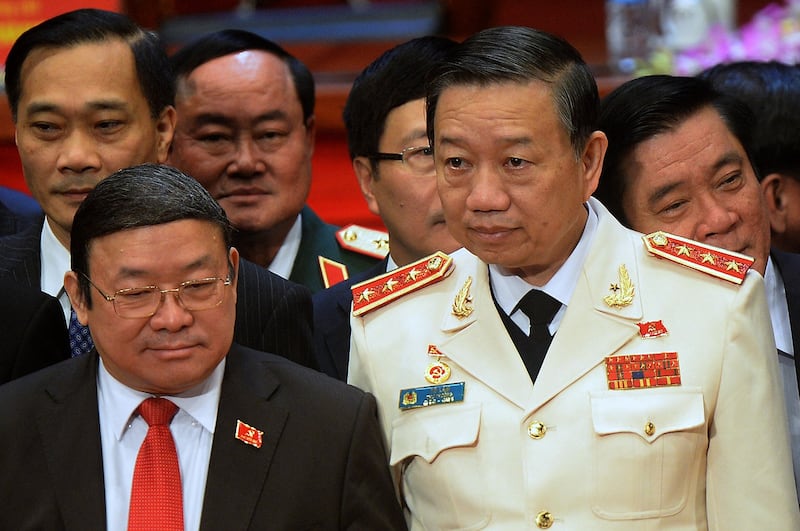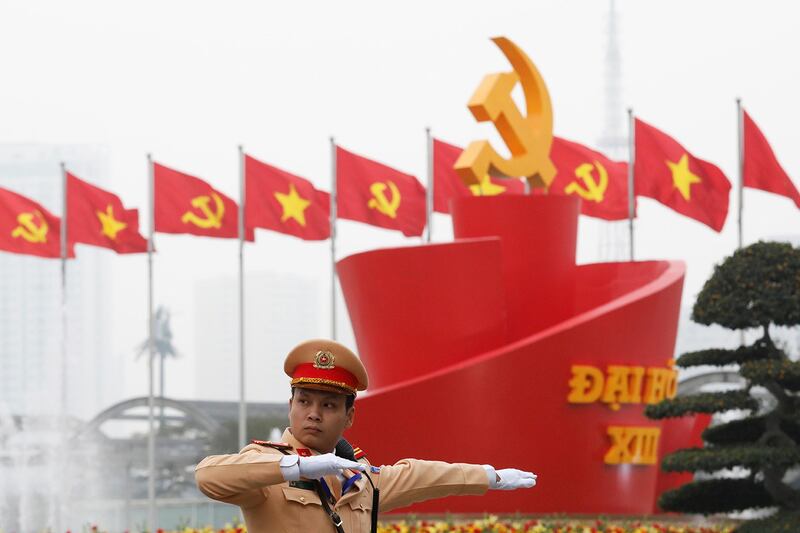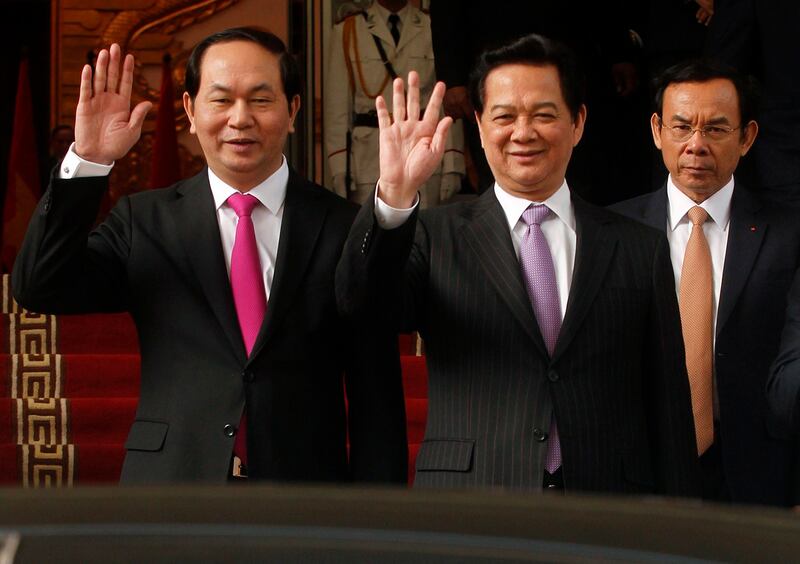Much attention has been focused on Vietnamese Minister of Public Security To Lam, who has weaponized anti-corruption investigations to systematically eliminate his political rivals as he maneuvers to be the next general secretary of the Communist Party of Vietnam.
Lam’s potential rise raises questions about how a career policeman would shape the ruling party’s personnel and policies.
But often lost in discussions of elite politics is the dominant position of the Ministry of Public Security (MPS). Vietnam’s sprawling security bureaucracy is responsible for everything from beat policing, to national investigations, to economic crimes, to border security, to firefighting, to intelligence and counterintelligence – and so much more.
Six Politburo members had been forced to resign since December 2022, leaving only 12 members, with the reported resignation of Truong Thi Mai. The loss of several economic technocrats has made the securitization of the Politburo, even more palpable.
In addition to Lam, four other Politburo members came out of the MPS, making it the largest block on the Politburo with five of 12, or almost 42% of the seats.
If one includes Generals Luong Cuong and Pham Van Giang of the People’s Army, which after all is a party-army that is duty-bound to defend the socialist system and CPV, then seven of 12 (58%) Politburo members hail from the security sector.
There are two things to take away from that. First, it is a reflection of the regime’s concerns about color revolutions and peaceful evolution. The senior echelon of the party is dominated by people whose instinctive response to anything is control.

The second takeaway is the importance of the MPS as a means of political advancement. The People’s Security University, which is governed by the MPS, is arguably the leading producer of Politburo members; three incumbent members are alumni.
Many senior officials had long careers in the MPS before being transferred to government and party positions. Their formative experiences were in the security sector, which shapes how they view the world.
Prime Minister Pham Minh Chinh was a career policeman, who from 2006 to 2009 was the deputy head of the MPS General Intelligence Department, and then briefly the head of the General Department of Logistics and Technology.
From 2010-2011, Chinh served as a deputy minister, retiring with the rank of lt. general. From there he moved into the party apparatus in the northeastern province of Quang Ninh.
Soviet Union’s lesson
Nguyen Van Nen, who is currently the Ho Chi Minh City party secretary and a member of the CPV Secretariat, served as a policeman in the southern province of Tay Ninh for 17-years, before moving into that province’s government and party positions.
In part due to his MPS experience, in 2011, Nen became a member of the Central Highland Steering Committee, which is responsible for oversight and policies in the region that continues to face unrest from ethnic minorities.
Phan Dịnh Trac, who now serves as the head of the Central Committee’s Internal Affairs Commission and member of the CPV Secretariat, was also a career policeman. Having graduated from the People’s Security University, he served in the MPS from 1980 to 2005.
From 2005 to 2010, Trac served as the deputy party chief in north-central Nghe An province and as the party chief from 2010-2013. Trac then took up a series of senior party positions on the Central Committee’s Internal Affairs Commission, as well as on the Central Inspection Commission, which investigates corruption of mid- to senior-level officials.

Nguyen Hoa Binh is the chief justice of the Supreme Court and a member of the CPV Secretariat. Binh is from the southern province of Quang Ngai, but is a “red seed,” whose family moved to the north after the 1954 division of the country.
Binh also graduated from the People’s Security University and then spent four years, from 1987 to 1991, as a fellow at the Academy of the Ministry of Internal Affairs in the Soviet Union. There he had a front row seat to the collapse of the Soviet Union and the implosion of its Communist Party. This experience has, no doubt, shaped his world view.
Binh’s career in MPS largely focused on covering economic crimes, which has given him a unique perspective on the scope and scale of corruption in the country.
Binh’s MPS career culminated in 2007 to 2009 when he was promoted to Major General and Deputy Director General of the General Department of Police. He also served as the Deputy Head of the Investigation Agency.
After a stint in Quang Ngai’s party apparatus, culminating as the province’s party chief, Binh took over the Supreme Procuracy, in 2011, making him the country’s top prosecutor. Binh became the chief justice of the Supreme Court in 2016, giving him an unusually long tenure.
Chinese thinking and tactics
Since the Doi Moi (Renovation) era began in 1986, and due to the five forced resignations since December 2022, Vietnam has never had a less diverse Politburo, though it is expected to be expanded soon.
Under existing party rules, Politburo members have to retire at the age of 65 unless they receive a waiver. Ten of the 12 members should be forced to step down at the 14th Congress. But this goes against the historical norm of no more than 50 percent of Politburo members retiring at a party congress.
It looks like at least three members are likely to be given waivers, unless the Central Committee makes the unlikely decision to really clean house. That could concentrate the MPS bloc even more.
If Lam is elevated to be general secretary, his replacement would also be elevated to the Politburo.
In the 12th Congress, elected in 2016, four of 19 members had backgrounds in the MPS. So this security bloc is likely to be an enduring feature of Vietnamese politics.
Six of the 200 elected Central Committee members hail from the MPS, second only to the Ministry of National Defense and the uniformed services. While not quite institutional capture, it’s clearly institutional dominance.
This will have profound implications on the Vietnamese public and shape the Internet and social media, civil society and the economy. These men view everything through the lens of security and regime survival.

We saw just how insecure the regime is with Politburo Directive 24, issued in July 2023. It not only had warnings about peaceful evolution and color revolutions, but adopted current Chinese thinking on the threat posed by international investors and the donor community who could foment them.
Authorities recently arrested Nguyen Van Binh, an official at the Ministry of Labor, Invalids, and Social Affairs, and former trade unionist and expert at the International Labor Organization who had been pushing for the passage of a convention that would allow for the establishment of independent labor unions.
They are also utilizing more Chinese-style tactics: Binh was charged under Article 337, which criminalizes the illegal disclosure of classified information.
Regime security and economic development should go hand in hand. Economic growth does provide the CPV with performance legitimacy. But in practice it’s hard to get both running at the same time, and ultimately the need for security will trump economic pragmatism.
Zachary Abuza is a professor at the National War College in Washington and an adjunct at Georgetown University. The views expressed here are his own and do not reflect the position of the U.S. Department of Defense, the National War College, Georgetown University or Radio Free Asia.
